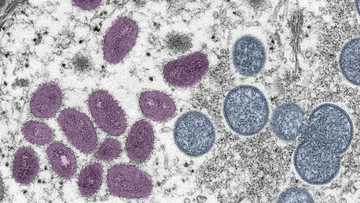Northern Region Disease Control Officer Denies Reports Of Ebola Outbreak In The Region
- Reports that an outbreak of Ebola virus has been confirmed in the Northern Region have been denied by health authorities
- Northern Region Disease Control Officer Fuseini Mahama said no case has been reported and that the deployment of health workers in PPEs was a mere simulation
- He also said the reported outbreak was not real but only a simulation, the Ghana News Agency reported on Wednesday
PAY ATTENTION: Click “See First” under the “Following” tab to see YEN.com.gh News on your News Feed!
The Northern Region Disease Control Officer has denied reports on Wednesday, June 6, 2022, that the region has recorded one case of the deadly Ebola disease.

Source: Instagram
Mr Fuseini Mahama told the Ghana News Agency that health officials seen in PPEs were only conducting a simulation exercise.
According to the news agency, Mr Mahama has said the reported outbreak was not real but only a simulation.
Earlier reports
Previous reports had stated that there was an outbreak of the virus the Northern Region.
PAY ATTENTION: Follow us on Instagram - get the most important news directly in your favourite app!
The GNA, for instance, said Public Health Emergency Response Team had been deployed to the area to contain the situation.
However, shortly after that the state-owned news agency reported again that the region had not recorded any case of the deadly virus.
About the dreaded Ebola
Ebola is a rare and deadly disease in people and nonhuman primates. It is a rare but severe disease that patients only recover from when they receive good supportive clinical care. Patients with good immune responses may also recover successfully from the disease.
Studies show that survivors of Ebola virus infection have antibodies (proteins made by the immune system that identify and neutralize invading viruses) that can be detected in the blood up to 10 years after recovery. Survivors are thought to have some protective immunity to the type of Ebola that sickened them.
The viruses that cause EVD are located mainly in sub-Saharan Africa and people can get EVD through direct contact with an infected animal (bat or nonhuman primate) or a sick or dead person infected with Ebola virus.
The U.S. Food and Drug Administration (FDA) has approved the Ebola vaccine, ERVEBO®, for the prevention of EVD. ERVEBO vaccine has been found to be safe and protective against only the Zaire ebolavirus species of ebolavirus.
Signs and Symptoms
Symptoms may appear anywhere from 2 to 21 days after contact with the virus, with an average of 8 to 10 days. The course of the illness typically progresses from “dry” symptoms initially (such as fever, aches and pains, and fatigue), and then progresses to “wet” symptoms (such as diarrhea and vomiting) as the person becomes sicker.
Primary signs and symptoms of Ebola often include some or several of the following:
- Fever
- Aches and pains, such as severe headache and muscle and joint pain
- Weakness and fatigue
- Sore throat
- Loss of appetite
- Gastrointestinal symptoms including abdominal pain, diarrhea, and vomiting
- Unexplained hemorrhaging, bleeding or bruising
- Other symptoms may include red eyes, skin rash, and hiccups (late-stage).
Many common illnesses can have the same symptoms as EVD, including influenza (flu), malaria, or typhoid fever.
Monkeypox: Ghana records cases in Eastern, Western and Greater Accra
YEN.com.gh reported in other news that the Ghanaian health authorities have confirmed five cases of the steadily spreading Monkeypox viral disease in three regions of Ghana.
The Ghana Health Service (GHS) has said the cases have been recorded in Ghana since May 24, 2022.
A Citi News report said the GHS disclosed at a press briefing on Wednesday, June 8, 2022 , that 12 suspected cases were detected and were investigated out of which five turned out positive. The cases were recorded in three regions: Eastern, Western, and Greater Accra.
PAY ATTENTION: check out news exactly for YOU ➡️ find "Recommended for you" block and enjoy!
Source: YEN.com.gh




